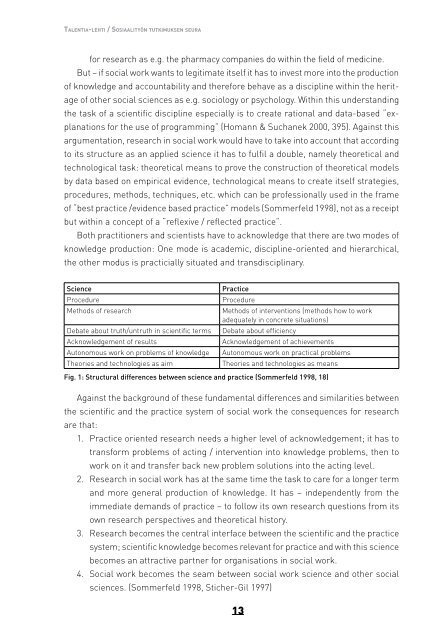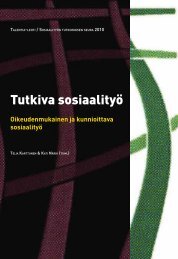Tutkiva sosiaalityö - Sosiaalityön tutkimuksen seura
Tutkiva sosiaalityö - Sosiaalityön tutkimuksen seura
Tutkiva sosiaalityö - Sosiaalityön tutkimuksen seura
You also want an ePaper? Increase the reach of your titles
YUMPU automatically turns print PDFs into web optimized ePapers that Google loves.
Ta l e n t i a-l e h t i / So s i a a l i t y ö n t u t k i m u k s e n s e u r a<br />
for research as e.g. the pharmacy companies do within the field of medicine.<br />
But – if social work wants to legitimate itself it has to invest more into the production<br />
of knowledge and accountability and therefore behave as a discipline within the heritage<br />
of other social sciences as e.g. sociology or psychology. Within this understanding<br />
the task of a scientific discipline especially is to create rational and data-based “explanations<br />
for the use of programming” (Homann & Suchanek 2000, 395). Against this<br />
argumentation, research in social work would have to take into account that according<br />
to its structure as an applied science it has to fulfil a double, namely theoretical and<br />
technological task: theoretical means to prove the construction of theoretical models<br />
by data based on empirical evidence, technological means to create itself strategies,<br />
procedures, methods, techniques, etc. which can be professionally used in the frame<br />
of “best practice /evidence based practice” models (Sommerfeld 1998), not as a receipt<br />
but within a concept of a “reflexive / reflected practice”.<br />
Both practitioners and scientists have to acknowledge that there are two modes of<br />
knowledge production: One mode is academic, discipline-oriented and hierarchical,<br />
the other modus is practicially situated and transdisciplinary.<br />
Science<br />
Procedure<br />
Methods of research<br />
Debate about truth/untruth in scientific terms<br />
Acknowledgement of results<br />
Autonomous work on problems of knowledge<br />
Theories and technologies as aim<br />
Practice<br />
Procedure<br />
Methods of interventions (methods how to work<br />
adequately in concrete situations)<br />
Debate about efficiency<br />
Acknowledgement of achievements<br />
Autonomous work on practical problems<br />
Theories and technologies as means<br />
Fig. 1: Structural differences between science and practice (Sommerfeld 1998, 18)<br />
Against the background of these fundamental differences and similarities between<br />
the scientific and the practice system of social work the consequences for research<br />
are that:<br />
1. Practice oriented research needs a higher level of acknowledgement; it has to<br />
transform problems of acting / intervention into knowledge problems, then to<br />
work on it and transfer back new problem solutions into the acting level.<br />
2. Research in social work has at the same time the task to care for a longer term<br />
and more general production of knowledge. It has – independently from the<br />
immediate demands of practice – to follow its own research questions from its<br />
own research perspectives and theoretical history.<br />
3. Research becomes the central interface between the scientific and the practice<br />
system; scientific knowledge becomes relevant for practice and with this science<br />
becomes an attractive partner for organisations in social work.<br />
4. Social work becomes the seam between social work science and other social<br />
sciences. (Sommerfeld 1998, Sticher-Gil 1997)<br />
13









